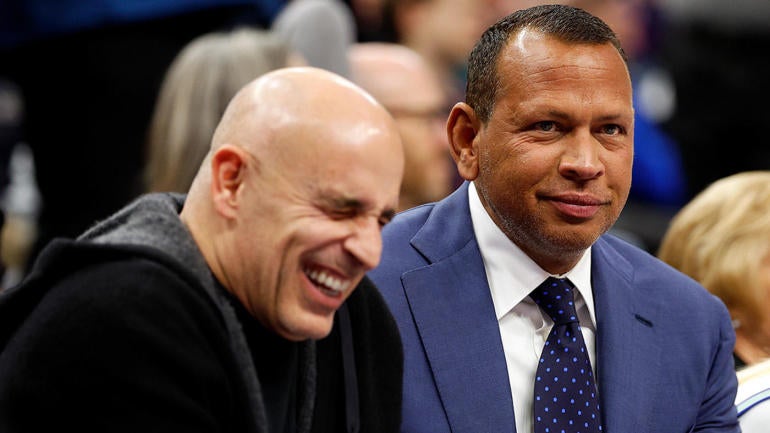
Minnesota Timberwolves owner Glen Taylor has never been known as a big spender in NBA terms. He hasn't paid the luxury tax once since its modern iteration came to be in 2011, though to be fair, he's rarely had a reason to. The Timberwolves have been among the worst teams in the NBA for the better part of two decades. Now, they appear headed for several years of contention, and the team's spending is seemingly at the center of the aborted sale of the franchise by Taylor to Alex Rodriguez and Marc Lore.
According to ESPN's Adrian Wojnarowski, documents that Lore and Rodriguez submitted to the NBA, Taylor and the Carlyle Group (a possible source of funding as they attempted to close their purchase of the team) showed that their new ownership group planned for a payroll of $171 million next season. For reference, the projected luxury tax for next season is $172 million, meaning that Rodriguez and Lore reportedly planned to duck the tax entirely.
In the context of Minnesota's roster, doing so would have been nearly impossible without gutting the team. Right now, Spotrac projects Minnesota's team salary for next season at roughly $185.7 million. That figure will immediately jump by roughly $7 million when Anthony Edwards makes an All-NBA Team. The contract he signed last summer includes a Rose Rule escalator that pushes the starting salary on the deal up to 30% of the projected $141 million cap so long as he is eligible, which an All-NBA selection would ensure.
That takes Minnesota's salary closer to $193 million... but it also must be noted that the Timberwolves have only 10 players under contract for next season. Even if the Timberwolves decided to roster only 14 players next season and even if those last four roster spots went exclusively to rookie free agents earning their projected $1.16 minimum salary, that is still ultimately a team salary that comes close to $200 million. This projection doesn't even include veteran minimum contracts for the end of their bench, let alone re-signing free agents like Kyle Anderson and Monte Morris, who should command more than minimum salaries in free agency.
If Rodriguez and Lore were indeed planning to duck the luxury tax entirely, that would basically mean shedding somewhere between $25-30 million in salary without taking any money back. There simply isn't a way to do that without ruining the roster. Minnesota could accomplish these savings by trading Jaden McDaniels (earning roughly $22.6 million next season) and either Naz Reid (roughly $14 million) or Mike Conley (roughly $10 million) into someone's cap space, but that would mean losing two of your six best players for nothing. If the Timberwolves had taken this approach, they not only would have avoided paying the luxury tax but, as Wojnarowski reports, would have positioned themselves to earn a luxury tax distribution projected at $6.5 million from the teams that actually do pay the tax next season.
The Timberwolves have a chance to earn the No. 1 seed in the Western Conference. They are built to compete for championships for years to come, and they have one of the brightest young stars in the sport in Anthony Edwards. A new ownership group taking over and immediately instituting such draconian cost-cutting measures would be unpopular, to say the least.
Of course, the reporting here doesn't let Taylor off of the hook here, either. According to Wojnarowski, Taylor believed that these measures "would jeopardize the franchise's ability to compete for a championship." In Taylor's own statement in which he announced that the Timberwolves are no longer for sale, he said he would "continue to work with Marc, Alex and the rest of the ownership group to ensure our teams have the necessary resources to compete at the highest levels on and off the court." This paints a picture of an owner willing to pay the tax himself, and doing so would not be cheap.
Let's say the Timberwolves do indeed keep this year's roster core together next season and estimate a team salary of $200 million. That would come with a tax payment of $76.5 million, bringing the total cost of the roster to $276.5 million. That would be the seventh-highest payroll in NBA history, trailing only the Warriors of the past four seasons and the Clippers of the past two, according to Spotrac data. When you factor in the lost $6.5 million tax distribution getting below the line would generate, the total cash difference in keeping the team together and the reported Lore-Rodriguez plan would be $112 million.
Taylor has the money to foot that bill, but his track record offers little evidence that he will be willing to. There are middle-ground solutions here that involve moving one core player instead of two. Minnesota could also opt to try to move All-Star Karl-Anthony Towns now, while his value is closer to its peak and before the dangers of his long-term contract become more apparent. Doing so would affect the current roster but would create a path to a more sustainable long-term roster. The cheaper Reid has proven capable of filling in for Towns in the short term, so there are arguments in favor of such a drastic change that pertains to basketball as much as finance.
But ultimately, the Timberwolves are built to win here and now. There is no version of that plan that does not include paying a very expensive roster. Wojnarowski's reporting suggests that the Rodriguez-Lore group was not prepared to do so. Only time will tell if Taylor actually is.
Looking for more NBA coverage? John Gonzalez, Bill Reiter, Ashley Nicole Moss and special guests dive deep into the league's biggest storylines daily on the Beyond the Arc podcast.






















